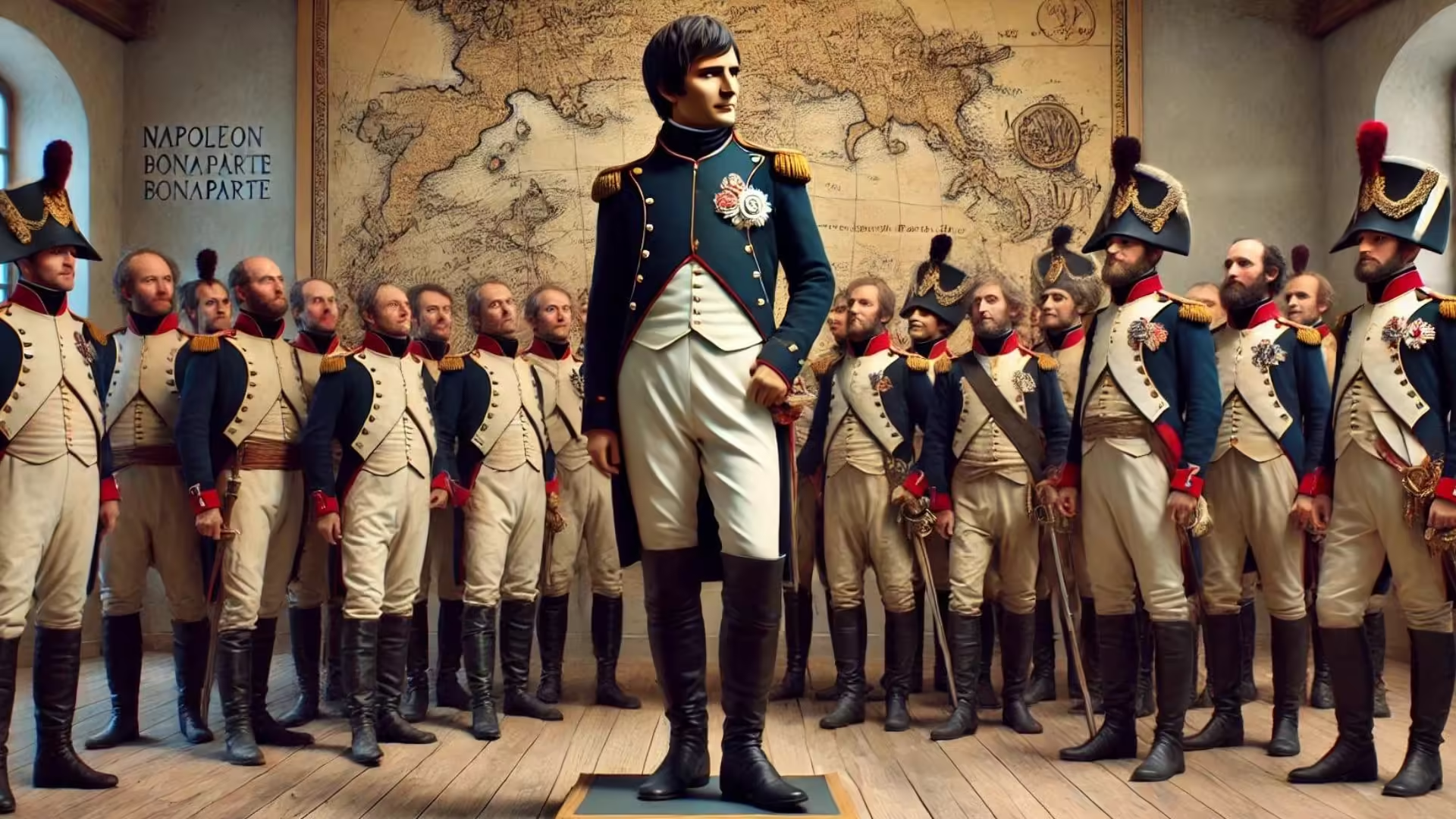When you think of Napoleon Bonaparte, one of the most common associations is his supposed short stature. The image of Napoleon as a short man has been etched into popular culture and history books for centuries. However, this characterization is misleading. In reality, Napoleon Bonaparte was of average height for his time. In this article, we will explore the origins of this myth, the historical context of average height during Napoleon’s era, and why this misconception has persisted.
The Origins of the Napoleon Height Myth
The myth of Napoleon’s short stature likely originated from a combination of misunderstandings and intentional propaganda. Here are some key factors that contributed to the myth:
- Measurement Differences:
- French and British Measurements: During Napoleon’s time, France used a different system of measurements. Napoleon’s height was recorded as 5 feet 2 inches in French measurements, which translates to about 5 feet 6 inches in modern English measurements. This was an average height for a man in the early 19th century.
- Miscalculations and Misinterpretations: British propaganda, aimed at undermining Napoleon’s image, may have exploited these measurement differences, promoting the idea of a diminutive stature.
- Propaganda and Satire:
- British Caricatures: British cartoonists and satirists often depicted Napoleon as a short man to belittle him. These caricatures were widely circulated and contributed to the enduring image of a short Napoleon.
- Psychological Warfare: Emphasizing Napoleon’s supposed shortness was a form of psychological warfare, aiming to undermine his authority and leadership in the eyes of the public and his enemies.
- Personal Characteristics:
- Commanding Presence: Despite his average height, Napoleon had a commanding presence and strong personality. His confidence and assertiveness might have made his enemies exaggerate his physical characteristics to create a more ridicule-worthy figure.
Average Height in the Early 19th Century
To understand why Napoleon’s height was actually average, it is important to consider the average height of men during his time. In the early 19th century, the average height for European men was significantly shorter than today’s averages. Here are some historical insights:
- Nutritional Factors:
- Diet and Nutrition: The diets of the early 19th century were less varied and nutritious compared to modern standards, impacting overall growth and height.
- Health Conditions: Frequent illnesses and lack of modern medical care also contributed to shorter average heights.
- Historical Records:
- Military Records: Military records from Napoleon’s time indicate that the average height of French soldiers was around 5 feet 5 inches to 5 feet 6 inches.
- Contemporary Comparisons: When compared to his contemporaries, Napoleon’s height was unremarkable, placing him well within the average range.
The Persistence of the Myth
Despite historical evidence to the contrary, the myth of Napoleon’s short stature has persisted. Several factors contribute to this enduring misconception:
- Cultural Reinforcement:
- Popular Media: Films, literature, and other forms of popular media have continued to depict Napoleon as short, reinforcing the stereotype.
- Common Phrases: Expressions like “Napoleon complex” perpetuate the idea that Napoleon was compensating for a lack of height with aggressive behavior.
- Simplification of History:
- Narrative Convenience: Simplifying historical figures into easily recognizable stereotypes makes them more memorable and accessible to the public.
- Educational Oversights: History education often focuses on memorable anecdotes and simplified characterizations, sometimes at the expense of accuracy.
Napoleon Bonaparte, far from being the short man of popular legend, was actually of average height for his time. The myth of his short stature arose from a combination of measurement misunderstandings, propaganda, and cultural reinforcement. Understanding the truth about Napoleon’s height not only corrects a common misconception but also sheds light on how history can be shaped by misinformation and bias.
By debunking the myth of Napoleon’s height, we gain a clearer and more accurate picture of one of history’s most fascinating and influential figures. This understanding encourages us to question other historical myths and seek out the truth behind the stories that shape our perceptions of the past.
Expand Your Vocabulary
Enhance your understanding of the topic by exploring these ten important words and expressions mentioned in the article. Understanding these terms will help you use them effectively in everyday English.
- Myth
- Meaning: A widely held but false belief or idea.
- Context: The myth of Napoleon’s short stature likely originated from misunderstandings and propaganda.
- Usage: The myth that carrots improve your vision is widely believed but not scientifically accurate.
- Propaganda
- Meaning: Information, especially of a biased or misleading nature, used to promote a political cause or point of view.
- Context: British propaganda aimed at undermining Napoleon’s image contributed to the myth of his short stature.
- Usage: During wartime, propaganda is often used to boost morale and demonize the enemy.
- Satire
- Meaning: The use of humor, irony, or exaggeration to criticize or mock someone or something.
- Context: British cartoonists and satirists depicted Napoleon as short to belittle him.
- Usage: The satirical article poked fun at the absurdities of modern politics.
- Caricature
- Meaning: A picture, description, or imitation of a person in which certain striking characteristics are exaggerated to create a comic or grotesque effect.
- Context: British caricatures depicted Napoleon as a short man to undermine his authority.
- Usage: The artist’s caricature of the celebrity exaggerated her distinctive features for comedic effect.
- Psychological Warfare
- Meaning: The use of propaganda, threats, and other psychological techniques to influence or intimidate an opponent.
- Context: Emphasizing Napoleon’s supposed shortness was a form of psychological warfare.
- Usage: Psychological warfare can be a powerful tool in both military and political conflicts.
- Commanding Presence
- Meaning: The ability to attract attention and convey authority, often through one’s demeanor or appearance.
- Context: Napoleon’s commanding presence and strong personality contributed to his influential leadership.
- Usage: Her commanding presence made her a natural leader in the boardroom.
- Historical Context
- Meaning: The circumstances or conditions in which something takes place, which help to explain it.
- Context: Understanding the historical context of average height during Napoleon’s era is crucial to debunking the myth.
- Usage: The historical context of the Civil Rights Movement is essential for understanding its significance.
- Nutritional Factors
- Meaning: Elements of diet and nutrition that affect health and growth.
- Context: Nutritional factors during the early 19th century contributed to the average height of people.
- Usage: Improved nutritional factors have led to increased average heights over the past century.
- Cultural Reinforcement
- Meaning: The process by which a belief or behavior is strengthened by societal norms and media.
- Context: The myth of Napoleon’s short stature has persisted due to cultural reinforcement through media and expressions.
- Usage: Cultural reinforcement can shape public perceptions and maintain stereotypes.
- Misinformation
- Meaning: False or inaccurate information, especially that which is deliberately intended to deceive.
- Context: The myth of Napoleon’s height is an example of how misinformation can shape historical narratives.
- Usage: Misinformation spreads quickly on social media, often leading to public confusion.
Let’s Talk
Engage with the deeper implications of the topic by reflecting on these thought-provoking questions. Consider discussing them with friends and family to gain a broader perspective.
- Historical Myths:
- What are some other historical myths or misconceptions you know of? How do they affect our understanding of history?
- Role of Propaganda:
- How does propaganda influence public perception and historical narratives? Can you think of modern examples?
- Impact of Satire and Caricature:
- How do satire and caricature shape public opinion about political figures and celebrities today?
- Measurement Standards:
- How do different measurement standards across countries and time periods affect our interpretation of historical facts?
- Psychological Warfare:
- How does psychological warfare manifest in contemporary politics and media? What are its effects?
- Cultural Reinforcement:
- How does cultural reinforcement sustain stereotypes and myths? Can you think of ways to challenge and change these perceptions?
- Commanding Presence:
- What qualities contribute to a commanding presence in a leader? Do you think these qualities are innate or can be developed?
- Nutritional Improvements:
- How have nutritional improvements over the past century impacted human health and development?
- Misinformation in the Digital Age:
- How does misinformation spread in the digital age? What steps can individuals take to verify the accuracy of the information they encounter?
- Historical Context Importance:
- Why is understanding historical context important when studying history? How can it change our perspective on historical events and figures?
By contemplating these questions, you can deepen your understanding of the topic and its relevance in various aspects of life. Share your thoughts and experiences in the comments below, and let’s start a meaningful conversation!










0 Comments